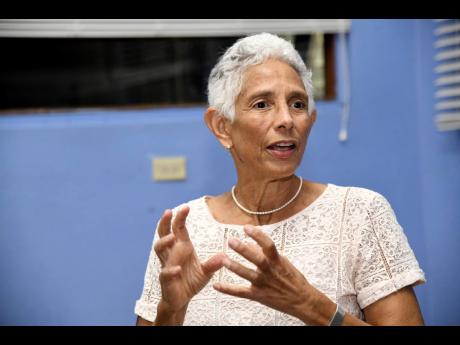Dingle Spence to serve on Lancet commission on cancer, health systems
Noted Jamaican physician Dr Margaret Dingle Spence will be representing Jamaica and the wider Caribbean at the global level after she recently accepted an invitation to serve on The Lancet’s commission on cancer and health systems.
Dingle Spence specialises in clinical oncology, radiation therapy, and palliative care with over 25 years of experience.
She is the current senior medical officer (SMO) of the Hope Institute Hospital, which is the nation’s only oncology and palliative care unit. The Lancet is a prestigious medical science journal that was founded in England 200 years ago.
During an interview with The Gleaner last week, Dingle Spence explained that she would be among a group of approximately 35 individuals, inclusive of scientific advisers, focusing on cancer and health systems within small island nations.
Dingle Spence’s passion for her field was birthed from her upbringing in a household where both parents worked as doctors.
She recalled how in her younger years she was always eager to follow her father, Dr Vernon Spence, to work.
He was one of the first radiation oncologists in Jamaica and served as head of the department of radiotherapy at the Kingston Public Hospital for about 30 years.
On these visits, he would use the opportunity to show her the different materials used in the department and explain their functions.
Margaret was the only one of the four children – her siblings – with the dream of becoming a doctor.
“I was fascinated from early on. I went to medical school and thought of doing many other things, including emergency medicine, but the problem with emergency medicine is that you see your patient for like half hour and you may never see them again, and for me, it’s about making a relationship,” she said.
Dingle Spence said she developed further interest in cancer patients as she was intrigued to find out their state of mind when faced with a life-threatening illness and whether they had a caring support network.
“So I ended up being that doctor who said, ‘Come, I can always do something for you. I might not be able to fix your cancer, but I can make you comfortable. I can talk to you about your worries. We can call in your family,’ she shared.
SUPPORT TEAM
Palliative care is specialised interventional care aimed at improving the quality of life of patients and their families who are facing challenges associated with life-threatening illness, whether physical, psychological, social, or spiritual.
“The beauty of palliative care is it’s a holistic speciality.” She noted that it steered away from the “medical model” of just dealing will the disease or illness of a patient but provided a support network for them.
This support team includes spiritual advisers, social workers, and physiotherapists who assist her to offer this intervention at Hope Institute.
Dingle Spence has already started the ball rolling to achieve her team’s objectives in the working group.
She engaged in her duties, working online for over nine months in 2022 through attending numerous Zoom meetings with international experts.
The 65-year-old currently sits on two Lancet commissions dedicated to improving cancer care and healthcare globally. She is well placed, with her vast knowledge and experience in writing on palliative care for the UK-based journal for numerous years as well as her 40 years of experience as a cancer physician.
The co-founder of Jamaica cancer care and research institute said that her team would be looking into the kind of strategies that could be implemented in getting cancer care into the community settings of lower middle-income countries (LMICs).
“People have done it, so can we pull together global literature [to] say ‘okay, well this one worked really well, here’s a model that might work in LMICs’,” she said.
Dingle Spence says the objective was to identify new ways of implementing these tactics that would best suit the circumstances faced in a country like Jamaica and not just to draw from previously used ones.
Through interacting with these international experts, she says she has learnt of differences between children living with cancer in high-income countries (HICs), formerly known as First World countries and lower middle-income countries as 90 per cent of cancer children living in HICs will survive as opposed to the 10 per cent or less that survive in LMICs, including Jamaica.
“That’s a huge disparity in care, and it’s the same through adult consults as well, but sometimes we use childhood cancer as an indicator as to what is going on in the health system because if you can’t save the kids, then you’re not doing so well,” Dingle Spence said.

